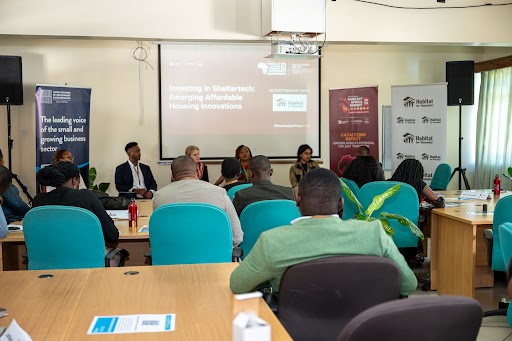

In a world grappling with economic, social, and environmental challenges, the significance of investing in innovative solutions cannot be overstated. Sheltertech, a burgeoning sector advocating for technology and innovation in addressing affordable housing challenges, stands out as a pivotal force for positive change. Recently, at the Sankalp Africa Summit 2024, a panel of experts convened to delve into the essence of sheltertech and its potential to reshape African communities while tackling pressing global issues.
Led by Masua Mutua, Regional Manager for Habitat for Humanity’s Terwilliger Center for Innovation in Shelter, the discussion underscored the multifaceted benefits of investing in sheltertech solutions. Despite its potential to advance Sustainable Development Goals and mitigate climate change, the sector has been historically underinvested. Mutua illustrated the transformative impact that increased investment in innovative affordable housing solutions can have on poverty alleviation, health, water and sanitation, gender equality, urban sustainability, and climate action.
A significant revelation from the session was that approximately 40% of carbon emissions originate from the construction industry. Despite that startling figure, only a small fraction of climate tech investments focuses on the built environment. With decarbonization becoming a priority under corporations’ ESG goals, there is an urgent need for focus and investments in cleaner, more efficient, and innovative solutions for the industry. By harnessing opportunities in the sheltertech space, startups and impact investors can enhance efforts in mitigating carbon emissions while also aligning with SDGs’ targets, paving the way for a more sustainable future.
Notable Solutions in Affordable Housing
H28: Operating in Nigeria, H28 facilitates access to housing financing for informal workers. By bridging the gap between the informal sector and formal housing finance, H28 is paving the way for middle-class households to realize their homeownership dreams.
Start Somewhere: This innovative company revolutionizes traditional construction methods by manufacturing hollow interlocking concrete blocks. By utilizing significantly less concrete, Start Somewhere offers a durable and economically friendly alternative to mainstream construction materials, exemplifying sustainable construction practices.
Lumkani: Based in South Africa, Lumkani addresses fire threats in informal settlements with its pioneering fire alarm system. By alerting residents of potential hazards, Lumkani’s solution has successfully mitigated the risk of catastrophic fire incidents, contributing to safe and resilient communities.
Nyumba Mkononi: Operating in Kenya, Nyumba Mkononi leverages blockchain technology to connect prospective homeowners with construction material suppliers. By enabling access to affordable housing materials, Nyumba Mkononi empowers individuals to embark on their homeownership journey.
Insights from the Panel Discussion
The panel discussion, featuring industry leaders and investors, provided valuable insights into the challenges and opportunities within the sheltertech landscape. As innovators strive to bring their solutions to fruition, the panel deliberated on various areas where support is essential, and how to foster a collaborative environment conducive to the growth of sheltertech initiatives.
- Holistic Approach: synergy between different segments invested in the growth of sheltertech products and services – including private sector and non-profit organizations such as Habitat for Humanity – play a crucial role in building awareness of sheltertech solutions and its contribution to broader societal well-being.
- Government Support: Frank Mwiti, EY’sEastern Africa Markets Leader, emphasized the pivotal role of government support and regulatory frameworks in fostering the adoption of sheltertech solutions. Co-developing innovative strategies with regulatory bodies can help overcome hurdles in the sector.
- Affordability Metrics: Michael Tekabefrom Ethiopian startup Kubik, and Richenda Leeuwen from ANDE, shed light on affordability metrics, emphasizing the importance of cost-effectiveness both at the inception and scale-up stages of sheltertech ventures.
As the session drew to a close, it became evident that sheltertech holds immense promise as a catalyst for transformative change. By harnessing the power of innovation, collaboration, and investment, we can pave the way for affordable, sustainable housing for all. As Margaret Mengo, Africa’s Regional Director for Program Operations at Habitat for Humanity eloquently stated, “home equals everything,” underscoring the profound impact that sheltertech solutions can have on communities worldwide. It is crucial to support this burgeoning sector, recognizing its capacity to foster a more equitable, resilient, and environmentally sustainable future.




